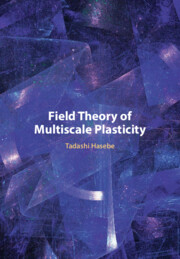Book contents
- Field Theory of Multiscale Plasticity
- Field Theory of Multiscale Plasticity
- Copyright page
- Contents
- Preface
- Acknowledgments
- Part I Fundamentals
- 1 Dislocation Theory and Metallurgy
- 2 Dislocation Dynamics and Constitutive Framework
- 3 Dislocation Substructures
- 4 Single Crystals versus Polycrystals
- Part II Theoretical Backgrounds
- Part III Applications I
- Part IV Applications II
- References
- Author Index
- Subject Index
2 - Dislocation Dynamics and Constitutive Framework
from Part I - Fundamentals
Published online by Cambridge University Press: 14 December 2023
- Field Theory of Multiscale Plasticity
- Field Theory of Multiscale Plasticity
- Copyright page
- Contents
- Preface
- Acknowledgments
- Part I Fundamentals
- 1 Dislocation Theory and Metallurgy
- 2 Dislocation Dynamics and Constitutive Framework
- 3 Dislocation Substructures
- 4 Single Crystals versus Polycrystals
- Part II Theoretical Backgrounds
- Part III Applications I
- Part IV Applications II
- References
- Author Index
- Subject Index
Summary
This chapter intends to provide a physically-sound foundation for constructing a constitutive framework applicable to a wide range of strain rate and a limited temperature rage around RT, by considering majorly the statistical mechanics-based dislocation dynamics, together with the phonon drag mechanism. In the statistical mechanics sense, dislocations in a crystal move most likely assisted by the thermal fluctuations at finite temperatures with the help of externally applied stress. Such a process can be described by the statistical mechanics-based dislocation dynamics. The probability to find the mean velocity of dislocations against obstacles under the external stress is given by the Arrhenius-type equation, which provides the basis of the constitutive modeling. The details of the formalism and its applicability are given in the following, after some important phenomenology and basic notions are presented.
Keywords
Information
- Type
- Chapter
- Information
- Field Theory of Multiscale Plasticity , pp. 86 - 138Publisher: Cambridge University PressPrint publication year: 2024
